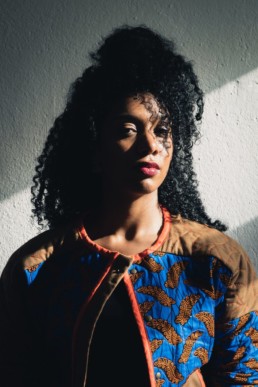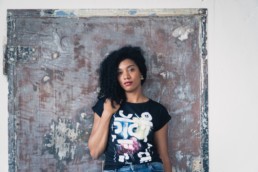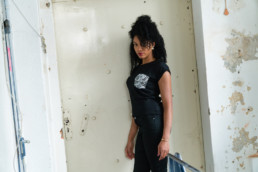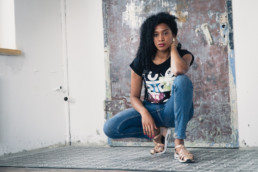Afrobeats is hot nowadays. Even though it has been around for a while, recent years has seen the genre taking the global stage of pop music by storm. Driving this popularity are innovative artists such as Wizkid, MHD or Sarkodie, whose appealing music videos have millions of YouTube views. Listeners from all over the globe seem to embrace this refreshing take on pop music.
Hamburg is no exception. Whereas before only local bars frequented by West-African clientele would play the genre, now big venues such as Uebel & Gefährlich regularly host Afrobeats parties.
A key player in this growing scene is Nerima Groove. A DJ since 2011, she is a first-hand witness of how Afrobeats turned from an overlooked genre into the next big thing. “Back when I started DJing”, she remembers, “everyone was playing Dancehall or Reggae”. Afrobeats served merely as something on the side and was played only on the rare occasion. Some would even view it as negative, laughing at the genre and describing it as “music from the jungle”.
Afrobeats has always been her passion, which cannot help but shine through whenever she talks about the genre; her voice accelerates and an infectious enthusiasm takes over her body. Partly because of her roots, partly because of the untapped potential, but first and foremost because of her love of the genre, Nerima made it her mission to push Afrobeats to the foreground.
The winds of pop music were blowing in a favorable direction for her. While Nerima was working on her DJ career in Hamburg, artists in Africa were stepping up their game. The quality of the sound improved, music videos became more original and marketing campaigns more effective. The era of “music from the jungle” came to an end and Afrobeats was getting ready to unleash its full potential.
At the same time, a change in consciousness was taking place, both in Africa and her diaspora. “Before, a lot of the artists tried to sound and look American, but now it‟s cool to be an African, to rock your real being”. A shift occurred, away from Eurocentrism and towards Afrocentrism – a shift from seeing anything Western as superior to rediscovering Africa as a source of culture, talent and innovation.
"Now it's cool to be an African, to rock your real being"
In Nerima’s eyes, it is all a matter of self-confidence. A more serious, self-reflective side of her reveals itself when she explains the crucial difference between self-confidence and vanity. According to her, vanity is to talk about being proud, to show off on social media for example, while self-confidence means to not wish yourself to be something else, to be content with who you are.
To talk about being proud is far more easy than to be content with yourself, and Nerima is keenly aware of the obstacles to becoming self-confident. “If you look at our history, our confidence has been low”, she says thoughtfully. Transatlantic slavery, colonial oppression, economic imperialism and postmodern migration have all left their scars on people of African descent.
Eager to see more of her introspective side, I ask her how does music help? – “Music has influence, you know, that’s why I choose it wisely”, she answers. Nerima is aware of the effects of her choice of music on her audience. If she plays uplifting music her audience becomes cheerful and positive, creating an atmosphere of acceptance and empowerment.
But the role of music is not limited to creating a vibe. Music also changes minds. “If you look at this new generation of people of African descent, you can see that Afrobeats has made them more self-confident”. I, by now fully infected by her enthusiasm, ask her: “So it’s way bigger than music!?” – “Of course”, she replies, “music has power”.
This article and the accompanying photos are the results of an interview taken during a photo shoot in Hamburg, Germany. The clothing Nerima wears is designed by Buki Akomolafe and Armah, two fashion designers that take their inspiration from Afrocentric aesthetics.
Find Nerima Groove on Facebook, Mixcloud & SoundCloud
Designers: Buki Akomolafe, & Armah
Photography by Janto Djassi
Art Direction by Beatrace Oola
Text by Uzoma Onwudiegwu






